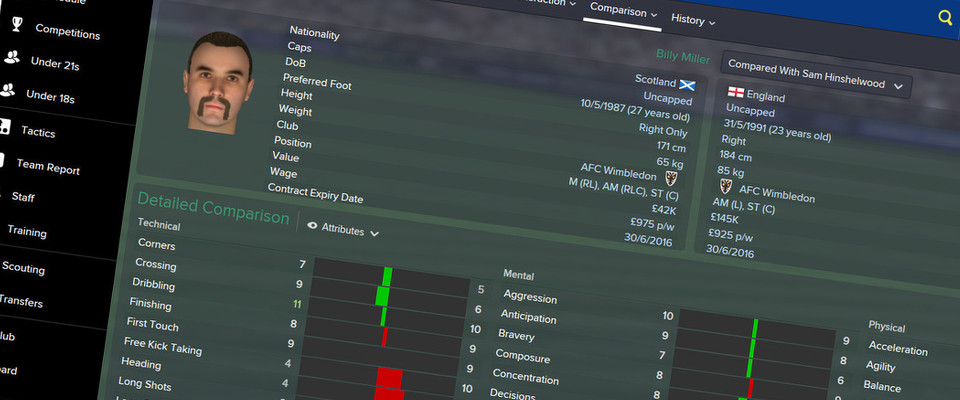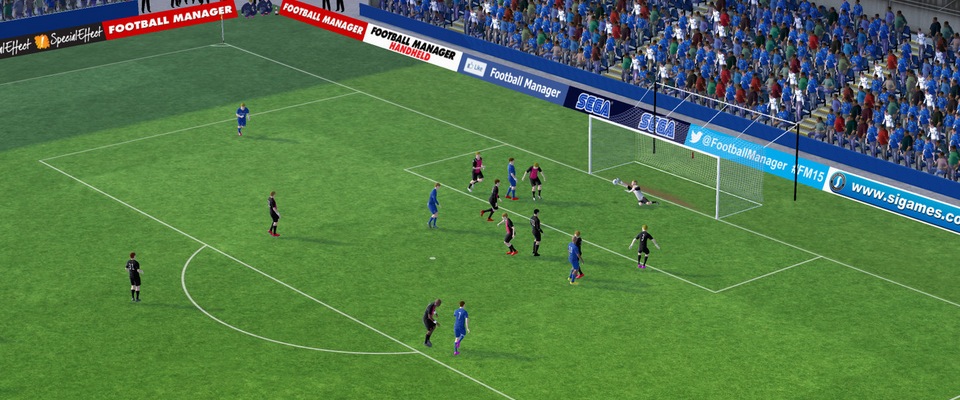Reviewing each successive year of Football Manager can become an exercise in sifting through minutiae. Delving into the latest version and constantly checking back in on last year’s iteration to double check comparable situations and the veracity of the new features you think you’ve uncovered. The game is so well established, so expertly created and so intricately researched that it’s almost impossible to point to anything they could change significantly and improve upon their record breaking formula.
It is somewhat surprising, then, that on loading 2015’s Football Manager game, there’s a few very significant and quite risky changes that almost immediately become apparent. Significant because they might just break the game, risky because they don’t actually need to make significant changes. In the modern video game industry, a big publisher will often err on the side of caution when they have such an gargantuan series to iterate upon. Not so with Football Manager.
The first big change comes before you even start to play the game. You’re now tasked with suggesting what kind of manager you’d like to be during the setup process. You’re allocated a number of points to award key managerial stats based on the level of experience you’ve selected for yourself. You can award these points to stats which dictate whether you’re the kind of tracksuit-sleeves-rolled-up manager that is a friend to all his playing staff or whether you’re a notebook-scribbling-mastermind who tactically enforces yourself upon the playing squad and outthinks the opposition. These stats have always existed but they were previously allocated automatically by the game, only uncovered and selectable if you’re willing to tinker about with some of the save game editors that are, quite frankly, cheating.
You can, of course, attempt to balance your point allocation but this leads to you being a jack of all trades that never quite excels at any. In attempting to spread your abilities, you fail to give yourself a clear path to take in the game’s interactions with playing and non-playing staff.
Any deficiencies in your own abilities can be made up by hiring the right staff and this year more than ever, coaches and scouts are of the upmost importance. It takes a little more time and investigation to uncover all the hidden stats of a previously unknown player so your scouting team’s existing knowledge and the ongoing cultivation of a good, broad knowledge base is essential. Growing those stats also takes a little more specific effort since players now complain when they feel they’re not getting enough time in particular coaching sessions and your coaching staff is now often more thinly spread across training sessions, increasing their workload significantly.

The second, and perhaps most significant change is in the layout of the game itself. There’s a new left hand panel that plays host to the most used menu options for navigating your club’s squads, dealings and finances. This might be born of a desire to make more resourceful use of the larger screens and higher resolutions people are playing on but it has the welcome side effect of making navigation smoother, simpler and – perhaps most importantly – faster.
Changing the way that players navigate a menu-based game like Football Manager runs the risk of tripping up your fan-base and their well practiced muscle memory traversal of the game but the system is instantly more accessible than last year’s horizontal menu buttons and it has very limited impact on the space on your screen that all the other usual panels sit in.
There’s further iteration to the 3D match engine, although that’s very much of the incremental variety. There are now many more animations and player movement is smoother but it’s still a longwinded way to get through a season and ultimately offers little for the seasoned FM player that they won’t get from blasting through a text-based match in half the time.
It is helpful to use regularly if you feel the need to check on the movement of players but as the 3D engine often frustrates by showing players orientated incorrectly for their positions or failing to make what appear to be simple interceptions, it can appear jarring at times too. So it remains a nice – and sometimes useful – feature to have but one that the most committed players will probably only want to use sparingly.

Likewise, there’s been iteration to the tactical systems. There are new roles within systems and the positional effect of a change in player instruction is now shown more clearly on the pitch. We’re certainly not talking about the move away from arrows a few years ago here but there is an extra layer of intricacy available and, for those of us who love to get our successes through acute tactical management, that’s always welcome.
I found that daring departures from traditional formations were now much easier to work around by using tactical roles and player instructions. For example, I had some success with a team formation using a great left winger sitting forward of the midfield, a solid midfield base and no right sided midfielder at all. I used a right sided defender as a wing-back and instructed a defensive midfielder to cover defence when needed. It wasn’t perfect but it wasn’t a clown show either and, with a bit more tinkering, I think I can make it quite successful.
Ah, there’s the essence of Football Manager: “with a bit more tinkering.” That’s the perfect summary of the game, really. It draws you in and it puts glory within your grasp, if you learn how to make use of the tools at your disposal.
This year’s release, more than any other, presents you with possibilities you might not have seen before – even if you’ve been playing the series for twenty years. It goes beyond the obvious things like tool tips and the inviting hints system. There is a level of intuition in the interface, of possibility in the tactical and training systems, and of plausibility in the interactions with players and other personnel within the game that makes you keep on exploring. There’s always something new to discover and it always makes you want to keep looking for the next thing that will give you an edge and make you the great manager you know you can be.
What’s Good:
- The most accessible FM in many years.
- Great new additions open up new tactical options.
- Interface changes make navigation much simpler.
- The most immersive, deepest simulation of football ever.
What’s Bad:
- Injuries are still simplistic.
- Challenge Mode hasn’t grown at all.
- Needs more clarity on tone of conversations.
Football Manager is not just a football game, it’s a football simulation. Although you could easily think of it as an incredibly complex open world RPG, there’s so much going on around your in-game existence that it’s not simply your personal experience, it’s a whole world of the beautiful game, happening inside your computer and you’re only the star – or villain – of your little corner of it. So much so that you feel it’s not really your game of Football Manager, you’re merely playing a role in its grand simulation of one possible universe of football in an infinite number of universes of football, each one starting when you click the “New Game” button.

ZYZ_10
Sounds like a significant improvement over the last couple of years (from what I’ve heard anyway as I haven’t bought FM since 2012). It might be time to upgrade! I just have to decide if I’m willing to let go of my league-winning Malaga side of 2098…